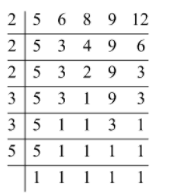Question
Question: Find the least number which is divided by 5, 6, 8, 9, 12 leaves a remainder 1 but when divided by 13...
Find the least number which is divided by 5, 6, 8, 9, 12 leaves a remainder 1 but when divided by 13 leaves no remainder.
A.3601
B.1469
C.2091
D.4879
Solution
Here, we will first find the LCM of 5, 6, 8, 9 and 12. We will assume that the required number is 1 greater than a multiple of the LCM. Then we will find the required number using Euclid’s Division Lemma.
Formulas used:
We will use the formula of Euclid’s Division lemma which is given by a=bq+r.
Complete step-by-step answer:
Let the required number be x. We know that when x is divided by 13, it does not leave any remainder. This means that x is divisible by 13.
Any number that leaves a remainder of 1 on being divided by 5, 6, 8, 9 and 12 will also leave a remainder of 1 on being divided by the LCM of 5, 6, 8, 9 and 12. We will find the L.C.M. of 5, 6, 8, 9 and 12:

Now, the L.C.M. is given by:
LCM=2×2×2×3×3×5LCM=360
As the number will leave a remainder 1 on being divided by 360, we will substitute 1 for r, x for a and 360 for b in Euclid’s division lemma, a=bq+r. Therefore, we get
x=360q+1……………………(1)
We will substitute different values for q in the above equation and check whether the x we obtain is divisible by 13. We will do this till we find a number divisible by 13. This method is called the method of trial and error.
Substituting 1 for q in equation (1), we get
x=360+1 ⇒x=361
361 is not divisible by 13.
Substituting 2 for q in equation (1), we get
x=360(2)+1 ⇒x=721
721 is not divisible by 13.
Substituting 3 for q in equation (1), we get
x=360(3)+1 ⇒x=1081
1081 is not divisible by 13.
Substituting 4 for q in equation (1), we get
x=360(4)+1 ⇒x=1441
1441 is not divisible by 13.
Substituting 5 for q in equation (1), we get
x=360(5)+1 ⇒x=1801
1801 is not divisible by 13.
Substituting 6 for q in equation (1), we get
x=360(6)+1 ⇒x=2161
2161 is not divisible by 13.
Substituting 7 for q in equation (1), we get
x=360(7)+1 ⇒x=2521
2521 is not divisible by 13.
Substituting 8 for q in equation (1), we get
x=360(8)+1 ⇒x=2881
2881 is not divisible by 13.
Substituting 9 for q in equation (1), we get
x=360(9)+1 ⇒x=3241
3241 is not divisible by 13.
Substituting 10 for q in equation (1), we get
x=360(10)+1 ⇒x=3601
3601 is divisible by 13.
∴ The least number which is divided by 5, 6, 8, 9, 12 leaves a remainder 1 but when divided by 13 leaves no remainder is 3601.
Option A is the correct option.
Note: The above method is a lengthy and tedious method. We can also find the answer by choosing the least number from the options and checking whether it is divisible by 13 and leaves a remainder of 1 on being divided by 360. Option B is divisible by 13 but doesn’t leave a remainder of 1 on being divided by 360. Option C is not divisible by 13. Option fulfils both the criteria, so it’s the correct option.
If a number (say a) on being divided by another number (say b) leaves a remainder r and has a divisor q, then according to Euclid’s Division lemma: a=bq+r
where 0≤r<b and a and b are integers.
